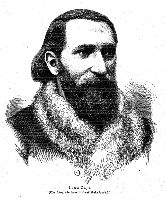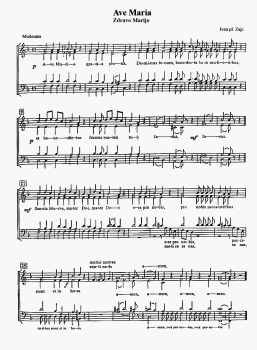Zajc, Ivan - Ave Maria
 for SATB choir a cappella
for SATB choir a cappella
 | Composer: Ivan Zajc (1832-1914) Aliases, aka: Ivan Dragutin Stjepan Zajc, Giovanni von Zayitz Country of origin / activity: Croatia | |
| Text author: traditional | ||
| Arranger / Editor: N/A |
| MIDI | MP3 | VID | First name | Last name | Birth | Death | comp | ID # | Title | Voicing | Instrumentation | |
|---|---|---|---|---|---|---|---|---|---|---|---|---|
| 1 | 1 | 1 | 1 | Ivan | Zajc | 1832 | 1914 | Ave Maria | SATB | a capella | ||
| 0 | 0 | 1 | 1 | Ivan | Zajc | 1832 | 1914 | Ave Maria | SATB | organ | ||
| 1 | 1 | 0 | 0 | Ivan | Zajc | 1832 | 1914 | Op933 | Ave Maria | low voice | organ | |
| 1 | 1 | 0 | 0 | Ivan | Zajc | 1832 | 1914 | Op.934 | Ave Maria | high voice | organ | |
| 1 | 1 | 0 | 0 | Ivan | Zajc | 1832 | 1914 | Op.937 | Ave Maria | mzSoprano | organ |
Available documentation:
Score: |
| My thanks and appreciation to Danijel Krilèiæ for sending me this score. |
Lyrics:
A-ve Ma-ri-a gra ti a ple-na | San-cta Ma-ri-a, ma-ter De-i, ma-ter De-i, o ra pra no bis, pro no-bis pec-ca-to-ri-bus nunc et in ho-ra mor-tis nos-trae, A-men. |
| MIDI: | MP3: not available |
| Play / stop MIDI |
| Recording: |
| not available |
Video - posted on YouTube:
Internet references, biography information:
| http://en.wikipedia.org/wiki/Ivan_Zajc |
From Wikipedia, the free encyclopedia Life Early success in Milan and Vienna Back home, he accepted the post of conductor and concert master of the Town Theatre Orchestra, taught stringed instruments at the Philharmonic Institute, and simultaneously wrote numerous compositions with his characteristic speed and ease. In 1860, his opera Amelia ossia Il Bandito was met with great success, though two years later, after a prolonged illness, Zajc chose to move to Vienna where opera and theatre were flourishing. His eight year stay there (1862–1870) was marked by further success, though he settled for composing operettas rather than operas. His first Viennese work, Mannschaft an Bord (1863), was enormously well received and his later operettas only served to strengthen his growing reputation. Yet interestingly, it was in Vienna where Zajc became involved with the Croatian academic society Velebit and frequently met with young Croatian students. Influenced by such Croatian cultural figures as bishop Josip Juraj Strossmayer and poets Petar Preradović, Ivan Trnski, August Šenoa, and Matija Divković, Zajc chose patriotism over worldfame and returned to Croatia. Return to Croatia Zajc's appointment at the opera was held until 1889, when owing to financial difficulties the organization lapsed for a time, but Zajc retained his post at the school until 1908, when he finally retired. He is credited with reviving Croatian music during a period of musical stagnation after the collapse of the Illyrian Movement and raising it to the artistic level where it stands today. His efforts paved the way for new and significant Croatian musical achievements in the early 20th century, which Zajc himself lived to see until his death on December 16, 1914 in Zagreb. |
 avemariasongs
avemariasongs org
org